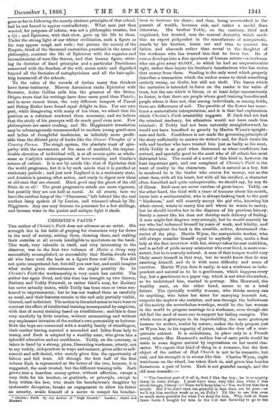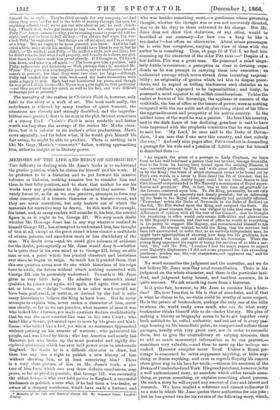CHRISTIE'S FAITH.*
THE author of Christie's Faith does not advance as an artist. His strength lies in his habit of groping for characters very far down in the mud of society, seizing them, cleaning them, and making their outsides at all events intelligible to spectators on the bank. This work, very valuable in itself, and very interesting to the observer, was in the first two volumes of Mattie a Stray very successfully accomplished, so successfully that Mettle dwells with all who have read the book as a figure from real life. You did not quite comprehend her, but still you saw her, and could imagine what under given circumstances she might possibly do. In Christie's Faith the workmanship is very much less careful. The author has again dived, and this time has brought up two thieves, Zachary and Teddy Fernwell, or rather thief's sons, for Zachary has never actually stolen, while Teddy has been once or twice sen- tenced to imprisonment; but he has not washed them as carefully as usual, and their features remain to the end only partially visible, blurred, and indistinct. The notion in his mind seems to have been to contrast the effect of intellectual training accompanied by suspicion, with that of moral training based on trustfulness ; and this is done very carefully by little touches, without sermonizing and without any unpleasant intrusion of the author's own personality as lecturer. Both the boys are connected with a wealthy family of wharfingers, their mother having married a scoundrel and fallen from lady to tramp, and Zech is adopted by a wealthy aunt, who gives him a splendid education and no confidence. Teddy, on the contrary, is taken in hand by a strong, pious, Dissenting workman, utterly, not to say rudely, independent in ways and manner, given alike to self- conceit and sell-denial, who merely gives him the opportunity of labour and full trust. All through the first half of the first volume Zech is represented as the better of the two, because, it is suggested, the most trusted, but the different training tells. Zech grows into a heartless money-getter, without affection, except a very little for his brother, or gratitude, or principle, except to keep within the law, who steals his benefactress's daughter by systematic deception, breaks an engagement to allow his father an annuity, avails himself of a secret to compel his benefac- • Christie a Faith. By the Author of " kligh Church." London: Bunt and Blackett.
tress to increase his share ; and then, being overworked in the pursuit of wealth, becomes sick, and rather a model than otherwise. His brother Teddy, on the contrary, thief and vagabond, but trusted, uses the manual dexterity which made him an expert pickpocket in the manufacture of marqueterie. stands by his brother, hunts out and tries to convert his father, and absconds rather than reveal to the daughter of the workman who has trusted him that he loves her. He of eourse develops into a fine specimen of human nature —a workman who can give away 40,000/., to which he had an unquestionable right, rather than injure his brother's benefactress who has stolen that money from them. Stealing is the only word which properly deikribes a transaction which the author seems to think something entirely wrong, no doubt, but still not theft. The lesson which the narrative is intended to force on the reader is the value of trust, but the one which it forces, or at least helps unconsciously to foster, is that there are people whom good training benefits and people whom it does not, that among individuals, as among fields, there are differences of soil. The parable of the Sower has some- times a materialistic interpretation, and it is that bad explanation which Christie's Faith irresistibly suggests. If Zech had not had the criminal tendency, his education would not have made him criminal ; if Teddy had not been naturally straightforward, he would not have benefited so greatly by Martin Wynn's upright- ness and faith. Confidence is not made the governing principle of the story sufficiently to answer its writer's end, for Zech treats his wife and brother who have trusted him just as badly as his aunt, while Teddy is as good when distrusted as when confidence has revived, and specially good to the aunt who of all others has most distrusted him. The moral of a novel of this kind is, however, its least important part, and our complaint of Christie's Faith is the want of reality in the characters. Zech is natural as a boy, but in manhood he is the trader who craves for money, not as the miser does, with all his heart, but with all his intellect, a character often described and quite unimprovable, we should say, by any fit of illness. Such men are never careless of great losses. Teddy, on the other hand, the thief with a trace of humour about his mouth, turns into a sentimentalist, who is always looking back to the past "blackness," and will scarcely accept the girl who, knowing his whole career, wants to marry him and whom he wants to marry, lest he should involve her in the disgrace of his previous history. Surely a career like his does not develop such delicacy of feeling. A man might feel disgrace very strongly, but he would scarcely be one who had redeemed himself by years of work, and fidelity, and who throughout the book is the sensible, active, determined cha- racter of the play. Martin Wynn, the marqueterie worker, who will always consider himself equal to anybody else, snubs a fine lady at the first interview with her, always takes his seat unbidden, and is as full of pride as any aristocrat who ever lived, is more con- sistent, but he is scarcely natural. A man of that temper would very likely assert himself in that way, but he would know that he was asserting himself, and do it with some difficulty and sense of exertion. Martin Wynn does it easily, is not a workman so inde- pendent and natural as to be a gentleman, which happens every day, but a gentleman in a paper cap, which is not what the author, as we understand him, wanted to portray. Mrs. Henwood, the wealthy aunt, on the other hand, seems to us a total. failure. The cynically worldly woman, who thinks money can do anything, who hates her sister for marrying beneath her, suspects the nephew she enriches, and sees through the hollowness of the society she nevertheless worships, would be the last woman in the world to propose marriage to a workman, even though she did feel the need of some one to support her failing energies. The whole scene is grotesque in its improbability, the more grotesque because its author, realist by nature, makes the lady propose just as Wynn has, in his capacity of joiner, taken the door off a mar- queterie cabinet. It is melodrama, in place only in a French novel, where Mrs. Henwood's sudden loss of caste pride would be made in some degree natural by imputations on her moral cha- racter. We expect that kind of thing in a romance, but the first object of the author of High Church is not to be romantic, but real, and his strength is in scenes like this. Charles Wynn, night, watchman on the wharf, has taken Zech in, and given him besides houseroom a pair of boots. Zech is not grateful enough, and the old man remarks :—
"The funniest part of it all is, that I like the boy ; he is so mighty sharp in some things. I must have been very like him when I was about his age, I fancy.'—' Then we'll keep him.'—' Yes, well try him for a month. But if he don't turn out grateful in that time, out he goes—or we'll try him another week or so, eh Polly ? I'd like to see him ever so much more grateful for what I've done for him. Why, look at them there boots I bought for him in the Cut last Saturday to go to the funeral in, in style. They're thick enough for any company.'—' And cheap they were.'—' I'm not in the habit of paying through the nose for anything—thank God! we've got our wits about us yet,' he said, chuck- ling. Thank God, we've got money to buy boots for other people—eh, Polly ?'—' Amen—amen !—why, you're coming round to your old self to- night,' and you've been so dull all day.—' I'm always dull when I'm wor- rited, Polly,' he explained ; 'but things are off my mind, and I'm as happy as a king. But he ought to be more grateful, you know. And if he had cried a little more about his mother, I should have liked to see it, but he didn't.'—'He sniffed,' said Polly.—'He sniffed a little, now and then; but he didn't take his loss what I call properly, and I really do believe, my girl, that them boots have made him proud already. If I thought so, I'd knock him down, and take 'em off again.'—' The boots give him a position,' said Folly, reflectively and decisively.—' Well, perhaps that's it,' asserted Mr. Wynn.' They gave him a rectangular position, and an elephantine kind of march at present; but then they were two sizes too large—although Polly had stuffed the toes with wool—and the heels themselves were quite a legacy in iron. Zech had run barefooted for years, and though he was proud of his boots—Mr. Wynn was quite right in that particular —yet they preyed upon his mind, as well as his feet, and were difficult to manage just at present."
The unreality of the realism in Christie's Faith is, however, only fatal to the story as a work of art. The book reads easily, the melodrama is relieved by many touches of quiet humour, the situations are cleverly and strongly described, and the improba- bilities once granted, there is interest in the plot, interest sometimes of a strong kind. Christie's Faith is more readable and better worth reading than the average of the stories Mr. Mudie circu- lates, but it is inferior to its author's other productions, Maisie more especially, and far below what, if he would give himself his fair swing, he might be able to produce. There is nothing in it like Mr. Gray, Mattie's " converted " father, nothing approaching him, either in insight or in literary power.































 Previous page
Previous page